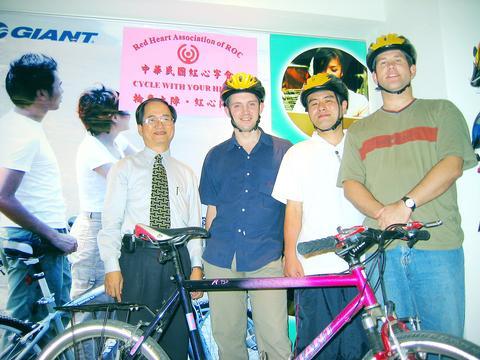On July 15, British national Toby Wilsdon, South African native Henry Badenhorst, Japan's Nakajima Kensaku and Taiwan's Huang Jin-bao
Dubbed "Cycle with Your Heart" the aim of the marathon cycle expedition is to raise NT$3 million for the Red Heart Association
Established in 1988, the Red Heart Association is a government-subsidized body that deals with a wide range of social problems that effect disadvantaged groups and individuals. It gives financial, legal and educational support to single parent families, the elderly, the handicapped and the families of prisoners.

PHOTO: GAVIN PHIPPS, TAIPEI TIMES
The non-profit organization receives roughly NT$21million from the government annually, but lacks an estimated NT$8million per annum to deal with its ever-increasing caseload. While the association holds regular fund-raising events, the up-coming venture is the largest event the association has been involved with.
"We hold activities to raise extra money every year, but compared to the cycle trip, these are very small-scale and private events," said association director, Warren Huang
All the participating cyclists have extensive experience with long-distance touring. Between them they've cycled well over 40,000km and taken in the scenery of four continents.
Two years ago Wilsdon completed a trip that took him from the UK to Singapore, Kensaku has circumnavigated Hokkaido twice and Badenhorst has undertaken cycling tours of South Africa's Mpumalanga Province.
The most traveled of the group, however, is Huang, who along with his wife and two teenage sons, began a 23,600km global trek in July 2002 and arrived home 13 months later. The adventure put them in the record books as the first, and only Taiwanese family to have cycled around the world.
"We've all had different experiences and toured in different places, but I'm sure we'll come together as a team and I'm confident these experiences will enable us to complete the trip," said Wilsdon. "It's obviously great to have [Huang] onboard both for his knowledge in planning the route and to make it a truly international team."
Huang, who only joined the team at the last minute, and his extensive cycling experience both in Taiwan and abroad have already proven to be invaluable. The round-the-world cyclist has been instrumental in planning the team's route and setting the pace.
"I looked at a few maps, but finding one with enough detail was very difficult. None of the maps I found had enough information for us to plan an exact route," said Wilsdon. "Huang joined the team, though, and he had plenty of detailed maps and was more than happy to devise the route and set the time frame."
Wilsdon's original estimate for completion was 15 days, based on information taken from his less-than-exact maps. This was quickly revised by Huang, who, along with resetting the timeframe to 10 or 11 days, also produced a detailed daily schedule that plotted everything from distances to exact "in saddle" times.
According to Huang's calculations, the team will cover an average distance of 86km per day, riding an average time of four hours per day -- and will spend a total of 47 hours in the saddle. Along the route the team hopes to be joined by members of local cycling groups and, although still to be confirmed, the team also hopes to see the participation of a city mayor or two.
As well as enlisting the help of Taiwan's top touring cyclist, the group will also receive assistance from local bicycle manufacturing Giant. As sponsors of the event the company will be providing the team with equipment ranging from the bicycles, to helmets, clothing and numerous spare parts and accessories. The British Council and South Africa's Liaison Office have also shown an interest and will be organizing events in various cities along the route.
The members of the cycling group might all have substantial experience, but none of them is taking the up-coming task lightly. Although none has either any plans, or time for that matter, to undergo a strict regimented training program before they set off, they have been taking to the streets during the weekends recently in preparation for the upcoming trip.
"To some extent it's going to be quite easy, especially in comparison with the trip I took from England to Singapore. Even if I'm fit enough this shouldn't be a problem. Sure, it will be uncomfortable, but I'm not expecting to want to give up along the way because it will be too hard," said Wilsdon. "That said, however, I'm not simply taking it for granted."
While the entire team remains upbeat about completing the trip within the estimated time frame, they realize that the trip will not be without its problems, especially with the summer heat.
"This will be an exceptional challenge for me. When I cycled in South Africa it was during the winter, but cycling in the middle of summer in Taiwan is a totally different ball game," said Badenhorst. "For me personally the weather will play a big role and fluids will be very important."
The searing heat doesn't worry Kensaku, however, as the Japanese national, who has only been in Taiwan one week, is more worried about the dangers posed by other road users. And while he shrugs off the possibilities of a major accident with a sheepish grin, he will be remaining vigilant.
"I haven't been in Taiwan very long and I've only ridden short distances in preparation for the trip so far," Kensaku said. "But from what I've seen I'm fully aware that it's very dangerous on the roads in Taiwan."

Google unveiled an artificial intelligence tool Wednesday that its scientists said would help unravel the mysteries of the human genome — and could one day lead to new treatments for diseases. The deep learning model AlphaGenome was hailed by outside researchers as a “breakthrough” that would let scientists study and even simulate the roots of difficult-to-treat genetic diseases. While the first complete map of the human genome in 2003 “gave us the book of life, reading it remained a challenge,” Pushmeet Kohli, vice president of research at Google DeepMind, told journalists. “We have the text,” he said, which is a sequence of

On a harsh winter afternoon last month, 2,000 protesters marched and chanted slogans such as “CCP out” and “Korea for Koreans” in Seoul’s popular Gangnam District. Participants — mostly students — wore caps printed with the Chinese characters for “exterminate communism” (滅共) and held banners reading “Heaven will destroy the Chinese Communist Party” (天滅中共). During the march, Park Jun-young, the leader of the protest organizer “Free University,” a conservative youth movement, who was on a hunger strike, collapsed after delivering a speech in sub-zero temperatures and was later hospitalized. Several protesters shaved their heads at the end of the demonstration. A

In August of 1949 American journalist Darrell Berrigan toured occupied Formosa and on Aug. 13 published “Should We Grab Formosa?” in the Saturday Evening Post. Berrigan, cataloguing the numerous horrors of corruption and looting the occupying Republic of China (ROC) was inflicting on the locals, advocated outright annexation of Taiwan by the US. He contended the islanders would welcome that. Berrigan also observed that the islanders were planning another revolt, and wrote of their “island nationalism.” The US position on Taiwan was well known there, and islanders, he said, had told him of US official statements that Taiwan had not

We have reached the point where, on any given day, it has become shocking if nothing shocking is happening in the news. This is especially true of Taiwan, which is in the crosshairs of the Chinese Communist Party (CCP), uniquely vulnerable to events happening in the US and Japan and where domestic politics has turned toxic and self-destructive. There are big forces at play far beyond our ability to control them. Feelings of helplessness are no joke and can lead to serious health issues. It should come as no surprise that a Strategic Market Research report is predicting a Compound